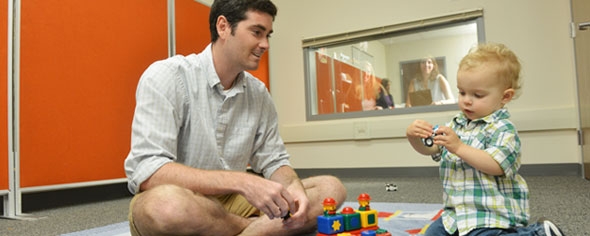
Chair: Elizabeth Votruba-Drzal, Ph.D.
Application Deadline: December 1
The Developmental Psychology Program trains students at the doctoral level in the major areas of development, including socio-emotional development; cognitive and perceptual development; motor development; language and communicative development; and social perception and social-cognitive development. Students master the current and historical theoretical issues that drive inquiry in developmental psychology and the research methods needed to address both basic and applied research questions. The goal of the program is to train productive developmental scientists for careers in academic settings, who are also prepared for non-academic careers that require an in-depth knowledge of child development theory and research.
Through close interaction with a faculty mentor, students achieve expertise in a particular area of inquiry within developmental psychology. At the same time, they acquire broad exposure to the multiple psychological processes underlying development through courses, seminars, colloquia, and attendance at national and international meetings. Collaborative research and cross-disciplinary training is strongly encouraged. Students become productive scholars by the time they earn the PhD, with multiple presentations and publications. Graduates of the program typically are hired into academic or research settings, with some students pursuing applied careers in social policy institutes, government, or health agencies.
The program has particular strengths in both early development and adolescence, with emphases in socioemotional, communicative, and cognitive development; family, peer, and romantic relationships; atypical development, including autism spectrum disorder and childhood psychopathology; and prevention/intervention and policy-related research. Developmental faculty utilize, and graduate students acquire multiple, converging methodological approaches, including experimental, correlational, observational, interview and remote assessments, psychophysiological, and neuroscience research methods in both cross-sectional and longitudinal designs. Advanced quantitative training is encouraged and pursued by most students.
Current faculty research includes:
- motor, communicative, and language abilities and their interrelationships from infancy through preschool age
- cognitive and perceptual development, especially basic number perception and concepts, early social perception, and mathematical cognition and achievement
- origins, development, and social-cognitive correlates of prosocial behavior in young children
- effects of early experience, especially socioemotional deprivation, on children’s cognitive and affective development, including neural development
- roles of race, ethnicity, culture, and socioeconomic status in social, emotional, and cognitive development, including the development of achievement motivation, academic skills, and school achievement
- personological, interpersonal, and sociocultural contexts of normative and atypical development in adolescence and emerging adulthood, including emotionality, empathy and callous-unemotional behavior, peer, family and romantic relationships, gender and sexual orientation, social media use, sexual behavior development, and body image
- family, peer, and neurobiological factors in the development and prevention of childhood and adolescent social and behavior problems, including aggression, antisocial behavior, anxiety, depression, risk-taking, including early or risky sexual behavior and drug/alcohol abuse, as well as the development and promotion of resilience
- early markers of autism and developmental disorders
Other notable features of the program include the international renown of the faculty, high quality of faculty mentoring, and excellent financial and academic support for graduate students who are treated as junior colleagues in a community of developmental scholars.
For additional information about requirements and training, see Developmental Program Student Handbook.
The Department of Psychology also offers PhD training in its Clinical/Developmental Program, and the School of Education offers a PhD in Applied Developmental Psychology. Which graduate Developmental degree is right for you? Click here.
Other Developmental Program Resources
- Office of Child Development
- Learning Research & Development Center
- Department of Psychiatry
- School of Education
Related Professional Societies & Foundations
- Society for Research in Child Development
- APA/Division 7: Developmental Psych
- International Congress of Infant Studies
- Cognitive Development Society
- Jean Piaget Society
- International Society for the Study of Behavioral Development
- Society for Research on Adolescence
- Society for Developmental and Behavioral Pediatrics
- American Academy of Pediatrics
- National Institute of Child Health and Human Development
- International Society for Autism Research
- Autism Science Foundation
- Autism Speaks